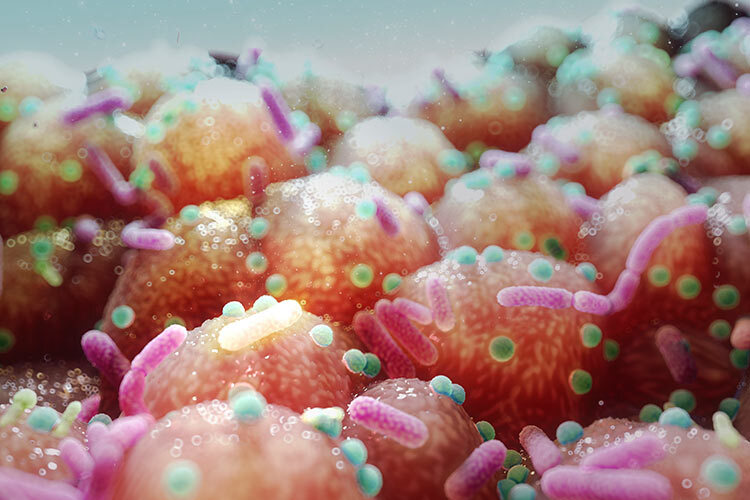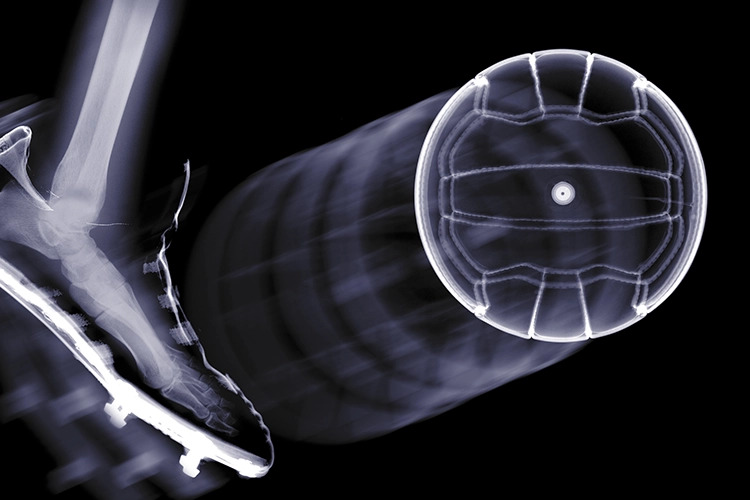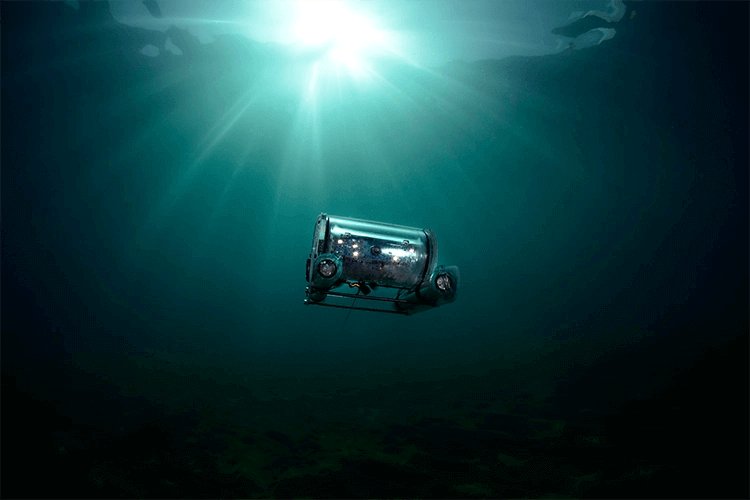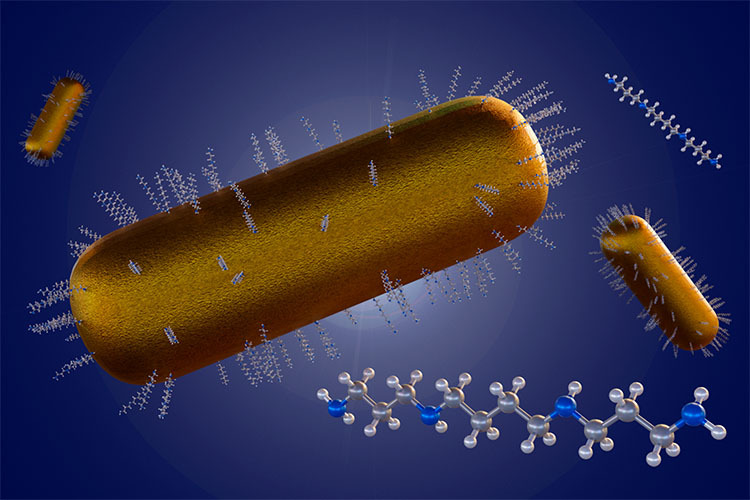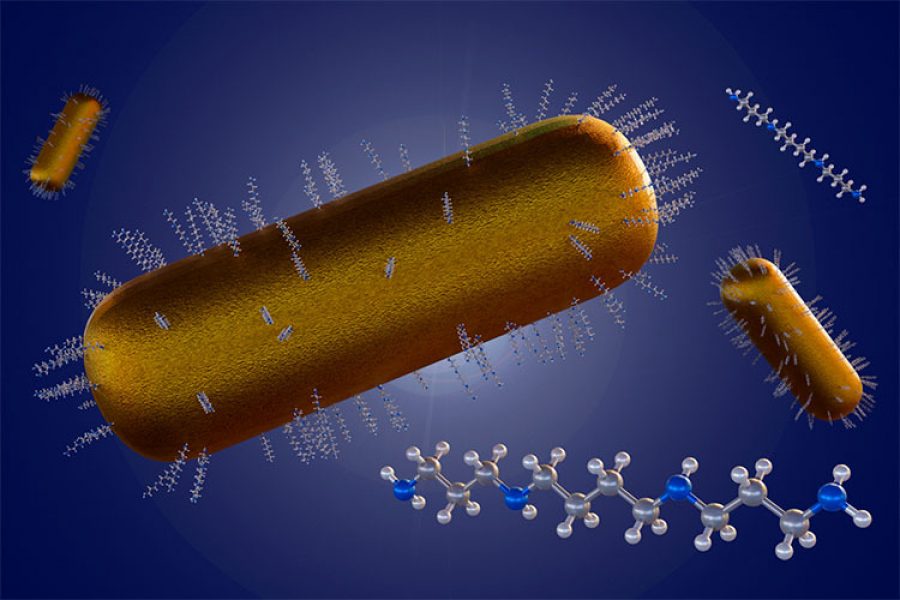By Ricardo García Gamboa, Misael Sebastián Gradilla Hernández, Carolina Senés y Alejandro García González
Our gut is much more than just a simple digestive tube. It is a living ecosystem full of bacteria and fungi, known as the gut microbiota, which plays a crucial role in our health and nutritional status. (1)
The search for solutions to the problem of overweight and obesity in Mexico —which affects more than 70% of adults in Mexico— has led to the exploration of new approaches, one of which focuses on studying the gut microbiota. This not only aids in the digestion and absorption of nutrients but also influences body weight.
It has been shown that people with obesity have a different composition of gut microbiota compared to those with normal weight. For example, bacteria from the Bacillota group, more common in people with obesity, are more efficient at extracting energy from food, which can contribute to weight gain.
In contrast, bacteria from the Bacteroidota group, which are less common in individuals with obesity, play a role in regulating appetite and satiety. As a result, people with obesity experience an imbalance between these two bacterial groups compared to those with a normal weight. (2)
Bacteria and Fungi in Your Gut
In the gut microbiota, bacteria are more abundant and diverse than fungi, which are also known as fungi group microorganisms. Differences in bacterial composition have been found among groups with normal weight, overweight, and obesity.
In a study conducted at Tec de Monterrey, changes in the abundance of bacteria from the Bacillota/Bacteroidota groups and body mass index were observed, suggesting a relationship between certain bacterial communities and body weight.
A notable case is the bacterium Akkermansia muciniphila, which showed greater abundance in people with overweight and obesity. Regarding gut fungi, Candida albicans were also more abundant in these same groups.
In fact, Candida albicans is a fungus associated with impaired metabolic health because it can trigger immune and inflammatory responses.
It is important to highlight how diet affects the abundance and diversity of the gut microbiota. For example, overweight and obese individuals who consume more meat-derived proteins increase the presence of the bacterium Faecalibacterium.
A relationship between certain types of bacteria and biochemical parameters was also found. For example, Akkermansia muciniphila showed a greater abundance associated with normal blood lipid and glucose levels, suggesting a beneficial relationship between this bacterium and metabolic health. (2)
Understanding Obesity
This study emphasizes the importance of investigating bacteria and fungi as integral components of our gut microbiota. Understanding their crucial roles in metabolism and weight control necessitates the innovation and development of diverse strategies for the comprehensive management of obesity and its implications on nutritional status.
These findings could serve as a starting point for developing personalized treatments that improve gut health, mainly through dietary changes.
By better understanding the relationship between gut microbiota, diet, and nutritional status, this study could indirectly contribute to promoting healthier and more sustainable diets, which in turn could positively impact environmental care. Therefore, continuing this type of research at the population level is essential to deepen our understanding of this relationship.
NOTE: This article is based on the work conducted by researchers from Tecnológico de Monterrey in Guadalajara, in collaboration with the Center for Research and Assistance in Technology and Design of the State of Jalisco (CIATEJ) and the Foundation for the Promotion of Health and Biomedical Research of the Valencian Community (FISABIO) in Spain. The study focused on the relationship between gut microbiota and nutritional status in the Mexican population. The research examined the composition of microorganisms in 30 Mexican adults, divided into three groups based on their weight: normal weight, overweight, and obese. The analyses included dietary assessments, body measurements, and biochemical tests, along with DNA analysis to identify the types of bacteria and fungi present in the gut.
References
1. Gebrayel, P. et al. Microbiota medicine: towards clinical revolution. Journal of Translational Medicine 20, 111 (2022).
2. González, A., Conceição, E., Teixeira, J. A. & Nobre, C. In vitro models as a tool to study the role of gut microbiota in obesity. Critical Reviews in Food Science and Nutrition 0, 1–12 (2023).
3. García-Gamboa, R. et al. Associations between bacterial and fungal communities in the human gut microbiota and their implications for nutritional status and body weigh t. Sci Rep 14, 5703 (2024).
Author
Ricardo García Gamboa. Researcher specializing in Gut Microbiota, has an academic background in Nutrition, Food Science, and Biotechnology Innovation. His research focuses on gut microbiota, obesity, probiotics, prebiotics, and the antimicrobial effect of functional ingredients. He has published scientific articles, has teaching experience at Tecnológico de Monterrey, and has conducted international research stays, showing an interest in human health, nutrition, and functional ingredients.
Misael Sebastián Gradilla Hernández
Professor at Tecnológico de Monterrey in Guadalajara since 2011. Currently, as a research professor, he leads the research axis of the institutional sustainability and climate change plan at Tecnológico de Monterrey and heads the sustainability and climate change laboratory. He is a member of the National System of Researchers Level 1. He has authored 52 journal articles and book chapters indexed in international journals.
Carolina Senés
Associate professor at Tecnológico de Monterrey in the Guadalajara Campus since 2018. Since 2019, she has been the director of the Department of Bioengineering in the Western Region. She specializes in microbial ecology and has collaborated on several national and international projects related to the analysis of microbial communities in plants, soils, and aquatic ecosystems using transcriptomic, metabarcoding, and metagenomic approaches.
Alejandro García González
Researcher in biomedical and biological systems, with a background in mathematics and biomedical engineering. His specialization focuses on modeling microbiota interactions and creating advanced gastrointestinal simulators, with an emphasis on synthetic microbiota models and 3D bioprinting platforms. He has successfully led the creation of patented medical devices and high-tech functional prototypes.
4
Misael Sebastián Gradilla Hernández
Professor at Tecnológico de Monterrey in Guadalajara since 2011. Currently, as a research professor, he leads the research axis of the institutional sustainability and climate change plan at Tecnológico de Monterrey and heads the sustainability and climate change laboratory. He is a member of the National System of Researchers Level 1. He has authored 52 journal articles and book chapters indexed in international journals.
Carolina Senés
Associate professor at Tecnológico de Monterrey in the Guadalajara Campus since 2018. Since 2019, she has been the director of the Department of Bioengineering in the Western Region. She specializes in microbial ecology and has collaborated on several national and international projects related to the analysis of microbial communities in plants, soils, and aquatic ecosystems using transcriptomic, metabarcoding, and metagenomic approaches.
Alejandro García González
Researcher in biomedical and biological systems, with a background in mathematics and biomedical engineering. His specialization focuses on modeling microbiota interactions and creating advanced gastrointestinal simulators, with an emphasis on synthetic microbiota models and 3D bioprinting platforms. He has successfully led the creation of patented medical devices and high-tech functional prototypes.
Misael Sebastián Gradilla Hernández
Professor at Tecnológico de Monterrey in Guadalajara since 2011. Currently, as a research professor, he leads the research axis of the institutional sustainability and climate change plan at Tecnológico de Monterrey and heads the sustainability and climate change laboratory. He is a member of the National System of Researchers Level 1. He has authored 52 journal articles and book chapters indexed in international journals.
Carolina Senés
Associate professor at Tecnológico de Monterrey in the Guadalajara Campus since 2018. Since 2019, she has been the director of the Department of Bioengineering in the Western Region. She specializes in microbial ecology and has collaborated on several national and international projects related to the analysis of microbial communities in plants, soils, and aquatic ecosystems using transcriptomic, metabarcoding, and metagenomic approaches.
Alejandro García González
Researcher in biomedical and biological systems, with a background in mathematics and biomedical engineering. His specialization focuses on modeling microbiota interactions and creating advanced gastrointestinal simulators, with an emphasis on synthetic microbiota models and 3D bioprinting platforms. He has successfully led the creation of patented medical devices and high-tech functional prototypes.
Misael Sebastián Gradilla Hernández. He has been a distinguished faculty member at Tecnológico de Monterrey in Guadalajara since 2011. As a research professor, he leads the institutional sustainability and climate change research plan, as well as the dedicated laboratory. Recognized as a Level 1 member of the National System of Researchers, he has made significant contributions to his field, authoring 52 articles and book chapters in prestigious international journals.
Carolina Senés Since 2018, she has been shaping minds as an associate professor at Tecnológico de Monterrey’s Guadalajara Campus. Elevated to the role of director of the Department of Bioengineering in the Western Region in 2019, she is renowned for her expertise in microbial ecology. Senés has been instrumental in numerous national and international projects, analyzing microbial communities in various environments through advanced techniques like transcriptomics, metabarcoding, and metagenomics.
Alejandro García González. He stands at the forefront of research in biomedical and biological systems, with a robust background in mathematics and biomedical engineering. His pioneering work in modeling microbiota interactions and developing sophisticated gastrointestinal simulators has set new standards in the field. Focusing on synthetic microbiota models and 3D bioprinting platforms, García González has successfully spearheaded the creation of patented medical devices and cutting-edge functional prototypes.
